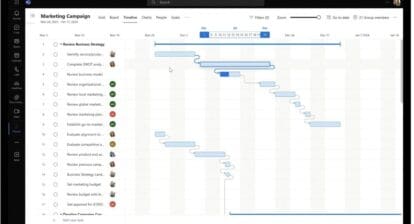
There’s a definite cycle to project management. You move from the input of technical data to the communication activities of human interactions. This cycle is constantly shifting as you move forward, changing at any moment the probability of success for project management. If data isn’t managed correctly, errors in timelines and schedules occur. When communication is fractured, the information doesn’t pass smoothly from one person to the next, causing broken timelines and missed opportunities. At any point in the process, the project can be compromised.
Communication, in the form of human interactions, and managed technical data work together like the shoreline of the ocean. The connection between the water and sand changes and adapts constantly, but the two usually flow together in harmony unless something gets in the way of the shifting tide.
One of the obstructions in a project cycle that hinders the forward momentum involves the ability to manage expectations. Expectations are perceptions that may or may not be true. For example, if your expectation is that everyone knows how to use a Gantt Chart correctly, then you might get upset when you learn that someone doesn’t know how to use it. Or you expect that someone will get his or her work completed on time, then become discouraged because the work isn’t finished when you expect it.
When your expectations don’t match the reality of the situation, then you might feel frustrated, angry or discouraged. These feelings obstruct your ability to focus on the project and the plan. You may become mired in past situations, communication breakdowns, or the need to prove value, fracturing the forward momentum of the current work. The advantages to managing expectations are that people see more efficient task management, improved communication and increased trust. These benefits have the added value of making the workplace a more comfortable and productive environment for work. You can manage expectations and keep the flow moving forward in your project management process.
In my experience, there are three important and intentional activities you can do to help manage expectations and create a flow in the project management cycle.
Keep a Forward Focus on the Goal
You waste valuable time and energy in the process when you talk about the problems or the people instead of coming up with solutions and plans. Keeping the focus on the goals helps with efficiency and communication. Think of how much time can be wasted worrying about what somebody did wrong or what went wrong in a situation. Identify the issue, then focus your time on creating a solution or implementing a corrective plan. Talking about the past slows down the process and creates an obstruction to finding a solution. The expectation that you can fix the problem by talking about how it happened or who is responsible impedes the flow of your work.
Don’t Judge Situations or People
We all must make judgment calls. However, when you judge something as good or bad or right or wrong, you’re labeling it as a problem instead of a situation. There’s a subtle difference between saying, “He is wrong” rather than “He did not manage that chart correctly.” When you say, “He is wrong,” you leave the door open to wasted time and energy from complaining about the idea that he is a problem, instead of thinking, “There is a problem.” When you say, “He did not manage the chart correctly,” you have the option of redirecting the situation back to how you fix the issue and where you need to go from here to change the outcome. Your expectations that something or someone is good or bad or right or wrong breaks down the flow of the process and creates a scattered feeling to the project. You stay on task and move away from the past when you manage your expectations about value judgments.
Make Sure Words and Actions Match
Words and actions that don’t match cause fracturing of authenticity, trust and efficiency. Your expectation that words and actions are going to match causes frustration and distractions from the project when this result doesn’t occur. An example of this fracturing is the situation where someone says that he or she will do something and then doesn’t complete the task. The project schedule becomes compromised. Extra time is needed to gain information about why the work wasn’t completed. Timelines that could have been smoothly revised take longer to manage.
The more times a fracture occurs, the greater the risk for compromising the process. When you manage both the cohesion of words and actions along with the Project Goals, you help to keep people accountable for their part in the project. Use an individual’s actions instead of words to gain the true measure of an individual when the two don’t match. Be aware of the weak link in the flow of your process if you lack control over the person who isn’t matching words and actions. Managing both your expectations and the authenticity of words and actions helps you maintain the movement of your project as it ebbs and flows.
Remember that expectations come from both your internal way of thinking and other people’s views of the world. You can better manage your personal expectations with these intentional activities. You may not be able to control all the expectations around you. However, having an awareness of expectations helps you better manage the project and maintain the flow of the project management cycle.





